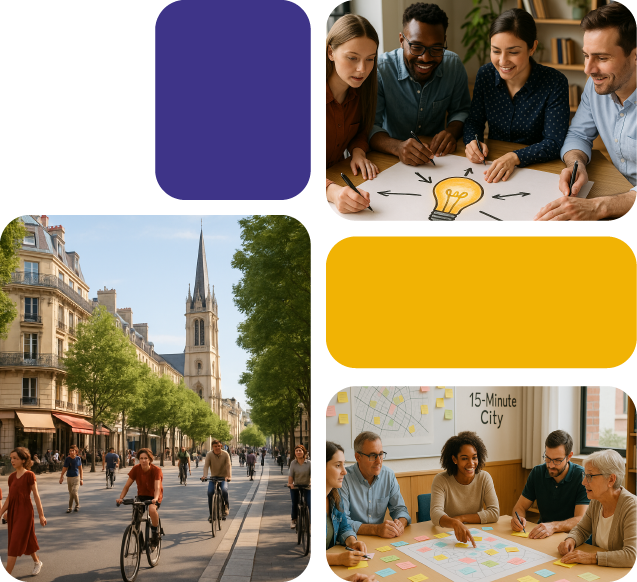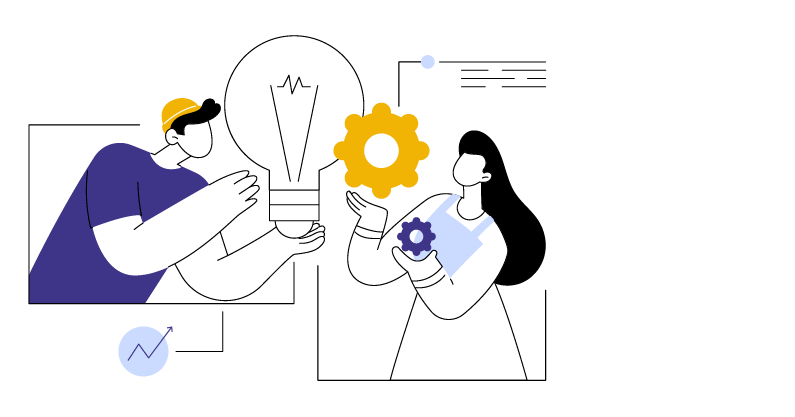Empowering Transitions to the 15-Minute City:
Unlocking sustainable urban mobility through citizen empowerment, institutional learning, and innovative tools.
Part of the 15-minute City pathway of the “Driving Urban Transitions” Partnership, UNLOCK15 is a collaboration of 22 partners spanning six European countries seeking
to unlock behavioral, institutional, and technological lock-ins that hinder the transition to the 15-Minute City.

Project Aims
UNLOCK15 is an alliance between research institutions, private enterprises, and public administrations aimed at empowering citizens and local authorities to overcome barriers to sustainable urban mobility. Focused on transitioning towards the 15-Minute City, this project emphasises inclusivity, innovation, and collaborative action in mid-sized European cities.

A Definition
The 15-Minute City is a vision of urban living where essential services—such as workplaces, schools, healthcare, leisure, and shopping—are within a 15-minute walk or bike ride from home. This concept promotes a sustainable, human-centered approach to urban planning, reducing car dependency and enhancing community well-being.
UNLOCK15 seeks to unlock behavioral, institutional, and technological lock-ins that hinder the transition to the 15-Minute City. Through participatory tools, co-created narratives, and actionable insights, we aim to shape a sustainable, human-centered urban future.

Consortium Partners
The UNLOCK15 consortium is a vibrant collaboration of 22 partners spanning six European countries, uniting a diverse mix of academic institutions, municipalities, SMEs, and non-profit organizations. The consortium is structured into 6 co-applicants and 16 cooperation partners, ensuring a comprehensive and inclusive approach to the project.







Cooperation Partners
Our 16 cooperation partners support the UNLOCK15 Project by collaborating in learning Living Labs, providing specialized expertise, and serves as connections to the local community. The cooperation partners consist of a diverse network of municipalities, policy labs, SMEs, and non-profit organizations, each playing a crucial role in applying research insights to real-world urban contexts. This group includes progressive city governments committed to sustainable mobility transitions, specialized consultancies that bring expertise in urban innovation and citizen engagement, and advocacy organizations that ensure diverse community voices are represented. By working closely with these cooperation partners, UNLOCK15 ensures that its tools, narratives, and empowerment strategies are tested and implemented in mid-sized cities across Europe, making the transition to the 15-Minute City both practical and scalable.
Our 16 Cooperation partners include:
• Urban Innovation Vienna – Policy Lab Austria
• Vienna Blooming Austria
• Verein Fairkehrswende Wien Austria
• ONE.16 Austria
• Verein MEI MEIDLING Austria
• Ville de Sète France
• Stadt Augsburg Germany
• Gemeente Almere Netherlands
• Humankind Netherlands
• Universiteit van Amsterdam Netherlands
• Cultuurhuis Almere Buiten / Stichting Openbare Bibliotheek Almere Netherlands
• Gemeente Arnhem Netherlands
• Municipality of Porto Portugal
• Associação pela Mobilidade Urbana em Bicicleta (MUBI) Portugal
• Campo Aberto Portugal
• Municipality of Örebro Sweden


Our Approach

Data-driven visualizations
for behavioral insights
UNLOCK15 leverages innovative data visualization tools to uncover patterns in mobility behaviors and highlight areas for improvement. These tools help stakeholders understand how infrastructural, behavioral, and institutional lock-ins shape mobility choices, enabling targeted interventions. By showcasing clear, actionable data, we aim to empower citizens, policymakers, and urban planners to make informed decisions that promote sustainable mobility.

Engagement through
Workshops and Co-Creation
Our participatory workshops and co-creation sessions serve as platforms for citizens, local authorities, and stakeholders to collaboratively envision their ideal urban future. Using techniques such as interactive storytelling, scenario building, and hands-on design exercises, these sessions build trust and shared ownership over urban mobility transitions. The goal is to ensure that every voice is heard, fostering inclusive decision-making processes tailored to the needs of diverse communities.

